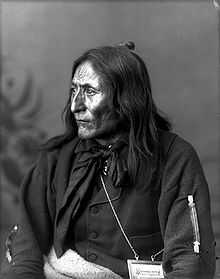Crowfoot
| Crowfoot | |
|---|---|
 Chief Crowfoot ca. 1885 | |
| Born | c. 1821–1830 |
| Died |
25 April 1890 Blackfoot Crossing |
Cause of death | Tuberculosis |
| Nationality |
Siksika (adopted) Kainai/Blood (born) Blackfoot Confederacy |
| Other names |
Shot close (baby name) Bear Ghost (boy name) Packs A Knife (former warrior name) |
| Known for | Chief of the Siksika First Nation, warrior, peacemaker |
| Parents |
Packs A Knife (father) Attacked Toward Home (mother) Many Names (adopted father) |
| Relatives |
Iron Shield (brother) Three Bulls (adopted brother) Scabby Bull (grandfather) Crying Bear (uncle) |
Crowfoot (c. 1821–1830 – 25 April 1890) or Isapo-Muxika (Blackfoot Issapóómahksika, "Crow-big-foot"[1]) was a chief of the Siksika First Nation. His parents, Istowun-eh'pata (Packs a Knife) and Axkahp-say-pi (Attacked Towards Home), were Kainai. His brother Iron Shield became Chief Bull.
He was only five when Istowun-eh'pata was killed during a raid on the Crow tribe, and a year later, his mother remarried to Akay-nehka-simi (Many Names) of the Siksika people.[2] The young boy was adopted by the Siksika, who gave him the name Kyi-i-staah (Bear Ghost), until he could receive his father’s name, Istowun-eh’pata.[2]
Because of his brave performance and injury during a battle, he was finally given his adult name, Isapo-muxika, taken from a deceased relative.[2]
Crowfoot was a warrior who fought in as many as 19 battles and sustained many injuries. Despite this, he tried to obtain peace instead of tribal warfare. When the Canadian Pacific Railway sought to build their mainline through Blackfoot territory, negotiations with Albert Lacombe convinced Crowfoot that it should be allowed.
In 1877 Colonel James Macleod and Lieutenant-Governor David Laird drew up Treaty Number 7 and persuaded Crowfoot and other chiefs to sign it. In gratitude Canadian Pacific Railway President William Van Horne gave Crowfoot a lifetime pass to ride on the CPR.
Although he was well respected for his bravery, Crowfoot refused to join the North-West Rebellion of 1885, believing it to be a lost cause. In 1886, Prime Minister Sir John A. Macdonald invited Crowfoot to Ottawa. Crowfoot hoped that during his visit, he could secure a pardon for his adoptive son, Poundmaker, who was involved in the rebellion.[3] Crowfoot went, as did Three Bulls and Red Crow, but soon he fell ill and had to return from Ottawa.
Crowfoot died of tuberculosis at Blackfoot Crossing on April 25, 1890. Eight hundred of his tribe attended his funeral, along with government dignitaries. Albert Lacombe wrote his biography upon his death.[4] When quoted, he is noted as an orator.[5]
What is life? It is the flash of a firefly in the night. It is the breath of a buffalo in the wintertime. It is the little shadow which runs across the grass and loses itself in the sunset. — Crowfoot's last words, 1890
In 2008, Chief Crowfoot was inducted into the North America Railway Hall of Fame. He was recognized for his contributions to the railway industry in the category of "North America: Railway Workers and Builders.[6]
The Ballad of Crowfoot
Crowfoot was the subject of a ten-minute 1968 National Film Board of Canada documentary The Ballad of Crowfoot, directed by Willie Dunn. The film explores the situation of aboriginal people in North America through the story of Crowfoot, featuring a montage of archival photographs, etchings, and newspaper clippings, set against a ballad by Dunn, a Micmac singer and songwriter. One of the first NFB films directed by an aboriginal filmmaker, the film received several awards including a Gold Hugo for best short film at the 1969 Chicago International Film Festival.[7] [8]
Bibliography
- Hugh A. Dempsey, Crowfoot: Chief of the Blackfeet, University of Oklahoma Press 1989, ISBN 0-8061-1596-3
References
- ↑ blkft.html
- ↑ 2.0 2.1 2.2 Biography at the Dictionary of Canadian Biography Online
- ↑ Letter from E. Dewdney to John A MacDonald. Library and Archives Canada, John A MacDonald Corresponces. MG26 A, Reel C-1597, Page 90546.
- ↑ Dempsey, Hugh A. (1957). The Early West. Edmonton: Historical Society of Alberta. p. 27.
- ↑ Wordsmith, A Word a Day, October 8, 2013
- ↑ "North America Railway Hall of Fame Inductee: Chief Crowfoot".
- ↑ "The Ballad of Crowfoot". Collections page. National Film Board of Canada. Retrieved 2009-10-02.
- ↑ "The Ballad of Willie Dunn". Curator's comments by Gil Cardinal. National Film Board of Canada. Retrieved 2009-10-02.
External links
| Wikiquote has a collection of quotations related to: Crowfoot |